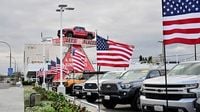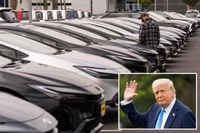As President Donald Trump prepares to implement a sweeping set of tariffs on imported vehicles and auto parts, the American automotive landscape is bracing for significant changes. Announced as part of his "Liberation Day" initiative, the 25% tariffs are set to take effect on April 3, 2025, raising concerns among consumers and industry analysts alike about the potential for skyrocketing prices on both new and used cars.
Trump's rationale for these tariffs is straightforward: he believes they will encourage consumers to buy American-made vehicles. "I couldn’t care less, because if the prices on foreign cars go up, they’re going to buy American cars," he told NBC News in a recent interview. However, the reality of the situation is more complex, as the tariffs will likely lead to a price increase of $5,000 to $10,000 on foreign cars, according to estimates from Wedbush, a financial services company.
The implications of these tariffs extend beyond just foreign imports. Automobiles manufactured in the U.S. will also see price hikes, as all vehicles produced in American factories contain a significant number of imported parts, primarily from Canada and Mexico. A February estimate from the Anderson Economic Group indicated that the cost of a car assembled in North America could increase between $4,000 and $10,000, with electric vehicles potentially costing at least $12,000 more.
Industry analysts predict that auto dealerships across the country will experience a surge in customer traffic this week as buyers rush to make purchases before the tariffs take effect. Miguel Colom from Pennsylvania expressed urgency in his decision-making, stating that a potential price increase of $12,500 on the Chevy Equinox EV he was considering would push the vehicle out of his budget. "We feel rushed to make a purchase before May because of the looming tariffs," he said.
In addition to immediate price concerns, the tariffs could lead to longer-term implications for the automotive market. Doug Schoepp, owner of Schoepp Motors in Wisconsin, noted that if the tariffs are implemented, new car prices could rise by as much as 25%, while used cars could see a minimum increase of 10%. With many consumers already feeling the financial strain from rising car prices—averaging over $48,000 for new vehicles—this situation could exacerbate the affordability crisis in the auto market.
Trump's tariffs have also sparked anxiety among automakers. The potential for increased costs could lead manufacturers to cut back on production or even eliminate certain models altogether, particularly those that are less profitable. Reports indicate that Ford Motor and General Motors could lose up to 30% of their earnings due to the tariffs, amounting to an estimated $110 billion hit to the auto sector.
Despite the looming price increases, Trump remains steadfast in his commitment to the tariffs, labeling them as "permanent" and asserting that the U.S. has been "ripped off" by foreign countries for decades. He has signaled that he might be open to negotiations if other countries are willing to offer something of value in return, although he has not specified what that might entail.
As the tariffs approach, many dealerships are already feeling the effects. Tom Tatich, general manager of a Toyota dealership in Washington, reported an increase in inquiries from customers concerned about future prices. "People are wanting to ensure that the prices quoted on inbound cars won’t change," he explained. This uncertainty is compounded by the fact that automakers have been stockpiling parts and vehicles in anticipation of the tariffs, which could temporarily hold down prices but ultimately lead to higher costs once inventories are depleted.
Automakers are faced with difficult decisions as they navigate the new tariff landscape. They can choose to relocate production from countries like Mexico to the U.S., increase domestic manufacturing, or stop selling less profitable imported models. However, these options come with high costs and logistical challenges. Industry experts warn that relocating factories can take years and involve complicated supply chains that span multiple countries.
Michael Cusumano, a professor at MIT, emphasized the potential for tariffs to disrupt the market and lead to higher prices for consumers. "It’s going to be disruptive and expensive for American consumers for several years," he stated. Some automakers are already raising prices in response to the tariffs, with Ferrari announcing a 10% increase on certain models.
The impact of these tariffs is likely to ripple through the automotive industry, affecting everything from production to consumer purchasing decisions. As prices rise, consumers may be pushed to hold onto their vehicles longer, further constraining the market and leading to a cycle of reduced sales and increased costs.
With the tariffs set to take effect imminently, the automotive industry and consumers alike are left to grapple with the uncertain future. Will the tariffs succeed in revitalizing American manufacturing, or will they simply lead to higher prices and a more challenging market for consumers? Only time will tell as the effects of these policies unfold in the coming months.






